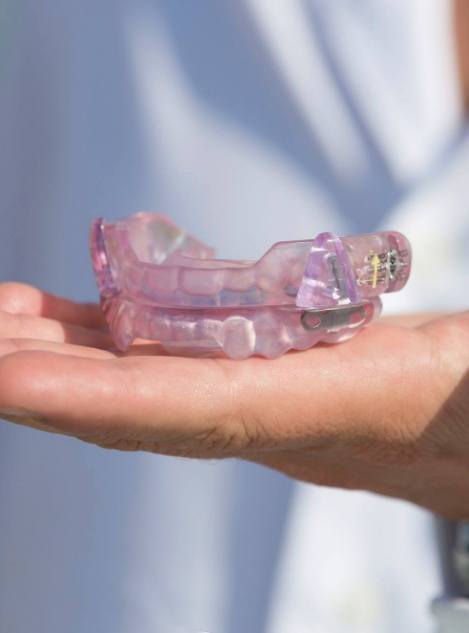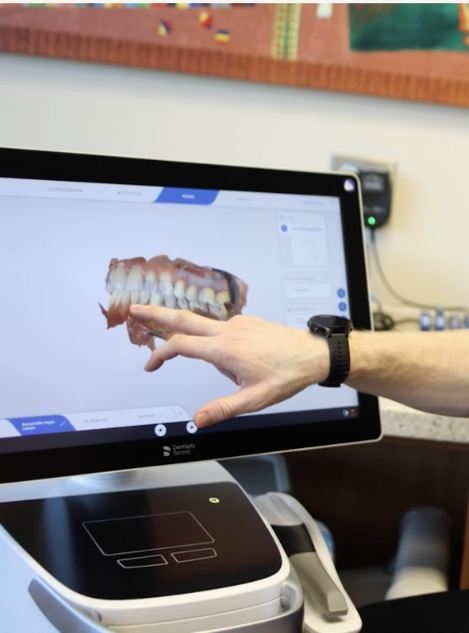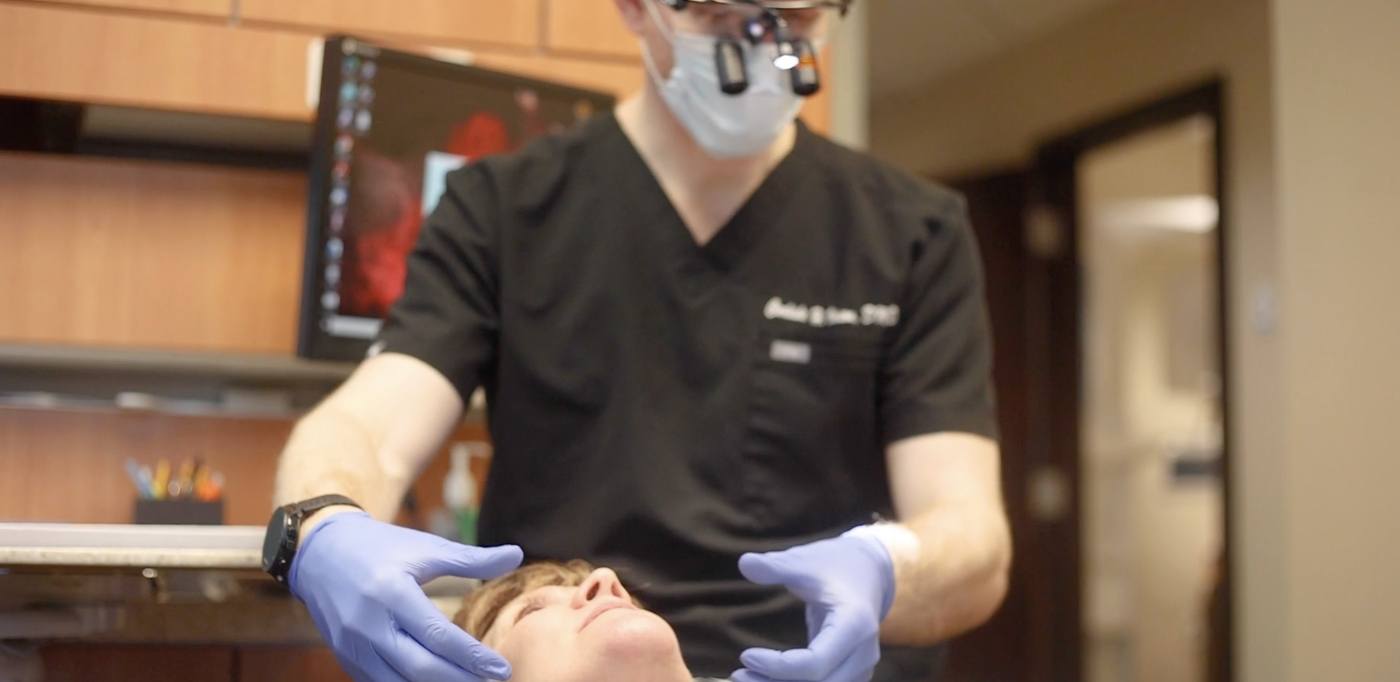TMJ Treatment – Buckhead, Atlanta
Treating Your Chronic Jaw Pain
Are you suffering from constant jaw pain or chronic headaches but aren’t sure what the cause is? In many cases, the answer could be that you’re suffering from a TMJ disorder, which essentially means that there’s a problem with the joint that connects your jaw to your skull. At Vason Family Dentistry of Buckhead, Dr. Vason can diagnose your TMJ disorder and help you figure out the best way to find relief for your symptoms. Give us a call today if you’re ready to put a stop to your pain with TMJ treatment in Buckhead, Atlanta, GA.
Why Choose Vason Family Dentistry of Buckhead for TMJ Treatment?
- Botox Injections to calm muscle activity
- Expertly Customized Occlusal Splints
- trigger point therapy to restore comfort
What Is TMJ Disorder?
The temporomandibular joint (TMJ) is located slightly in front of your ear on both sides of your head. It’s lined with cartilage and moves with a smooth, gliding motion. When the TMJ is functioning properly, it allows you to open and close your mouth to eat and speak.
However, the TMJ is highly complex; not only is it sensitive to stress in a variety of forms, but it’s also affected by the alignment of your bite as well as the condition of your jaw muscles. As such, many different issues could result in a TMJ disorder, which is typically accompanied by chronic pain, clicking in the jaw, and other symptoms.
TMJ disorder can range from mild to severe, and it often gets worse if it goes untreated for too long. If you want to enjoy a pain-free lifestyle again, you should call our office as soon as you think that you might be having problems with your TMJ.
TMJ Treatment Options

The underlying cause of a TMJ disorder can vary from patient to patient, and the kind of treatment you’ll need will depend on the details of your situation. Our dental practice’s solutions for TMJ pain include the following:
Occlusal Splints

An occlusal splint is an oral appliance that fits snugly over your teeth and shifts the jaw into a more relaxed position. By wearing an occlusal splint regularly, you can relieve the muscle tension around your TMJ, causing your discomfort to fade over time. Also, an occlusal splint can protect your teeth from clenching and grinding as you sleep, both of which are often linked to TMJ disorder.
Equilibrium/Occlusal Adjustments

When the teeth don’t come together properly, a TMJ disorder is often the result. We can make small adjustments to your teeth – usually by reshaping a few cusps or placing a restoration – so that they meet in the correct places. Once your bite has been properly balanced, it won’t be long before you experience relief from your TMJ-related symptoms.
Botox (TMJ)
While Botox is most well-known for its ability to reduce the appearance of facial wrinkles, it has long been a trusted method for relieving TMJ pain as well. By injecting it into a strained jaw joint, we can calm overactive muscles and allow them to finally relax. This can make chronic pain start to go away, help reduce TMJ-related headaches, and even put a stop to unconscious teeth grinding.
Trigger Point Therapy

Some patients can develop a trigger point in or around their TMJ, which is a sensitive area of hyper-tense muscles. This can create persistent pain that starts in the jaw and can easily radiate into the head, neck, ears, and more. After determining the location of the trigger point, we can inject a numbing agent or steroid to break up this tension and eliminate tenderness.
TMJ Treatment FAQs
How Is TMJ Disorder Diagnosed?
TMJ disorder, also abbreviated as TMD, can be diagnosed by Dr. Vason during a comprehensive examination. He’ll check the positioning of your teeth, ask you to perform certain jaw movements, and look for any signs of concern inside your mouth. It also might be necessary to take diagnostics like X-rays to truly get to the bottom of what’s impacting your jaw joints, and we might also need to review certain factors in your lifestyle or look at your medical history. However, once we have a clearer idea of what’s going on and what symptoms you’re experiencing, we can begin putting together a custom treatment plan that focuses on both short- and long-term pain relief.
Is TMJ Treatment Safe?
For many patients, the first question that comes to mind has to deal with the safety of TMJ treatment. You’ll be happy to hear that when performed by a qualified professional, such as Dr. Vason, TMJ treatment is perfectly safe and should not cause any ill effects. You should also note that when it comes to treating issues with the jaw joints, conservative methods are also considered first. Two of the most common TMJ treatment options available are occlusal splints and occlusal adjustments, and both are proven to be both overwhelmingly safe as well as remarkably effective at managing symptoms linked to TMJ disorder. Remember, trying to treat your TMJ issues yourself using a method that isn’t backed by medical science may lead to you hurting your jaw further, worsening your symptoms.
How Do I Know If I Need TMJ Treatment?
You might need TMJ treatment if you experience persistent, radiating jaw pain, difficulty or pain while chewing, clicking or popping sounds in your jaw, or changes in how your upper and lower teeth fit together. Other symptoms like headaches and migraines, earaches, and neck pain can also indicate TMJ issues. If any of these symptoms are consistent and interfere with your daily routine, or even your ability to rest comfortably, you shouldn’t wait to consult with Dr. Vason to discuss your treatment options.
How Long Does TMJ Treatment Take?
Ultimately, the timeline for TMJ treatment in Buckhead depends on the specific solutions being used, as well as the severity of the present issues. For example, occlusal splints, which are similar to nightguards, can be worn every night from a few weeks to a few months, to even years, potentially—it depends on how long it takes for the symptoms to be resolved. Likewise, occlusal splints can also vary in how quickly they bring relief; however, patients usually notice a huge improvement in their symptoms very soon after treatment. The same can often be said for when BOTOX is used to provide relief. Remember, TMJ issues don’t typically resolve on their own—so any time spent waiting around is time that could’ve been spent on relieving your discomfort! Also, remember that since the jaw joints are so complex, routine visits allow us to keep an eye on things and ensure no harmful symptoms return in the future.

